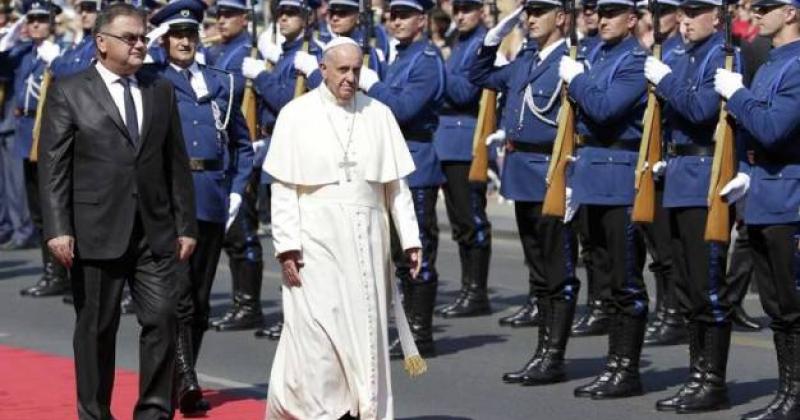In his first address to authorities in Sarajevo, Pope Francis called on them to go beyond the Dayton Accords and asked for real religious freedom in Bosnia-Herzegovina. On the outbound flight he reminded journalists that “the country has suffered a great deal and is now on a beautiful path of peace”.
“In order to successfully oppose the barbarity of those who would make of every difference the occasion and pretext for further unspeakable violence, we need to recognize the fundamental values of human communities.” Pope Francis’ flash visit to Sarajevo began with an appeal for peace and the recognition of the foundations of peaceful co-existence and also with the Pope’s request to political authorities to strive for religious freedom to ensure that “all citizens” are “equal both before the law and its implementation, whatever their ethnic, religious or geographical affiliation.” He asked for further steps to be taken to reinforce “mutual trust” between all components of the nation.
Francis arrived at Sarajevo airport at 9 am. During the civil war, the Bosnian capital was the only corridor for humanitarian aid. He was welcomed by the Croatian member of the country’s Presidency, Dragan Čović. The first item on the agenda was a courtesy visit to the Presidency of Bosnia-Herzegovina, whose chairman is currently the Serbian Mladen Ivanić. The Pope arrived having crossed the Sniper Alley: many of the surrounding buildings still bear the signs of the bullets fired, in memory of what happened.
Francis pronounced the first speech of today’s visit in the Presidential Palace hall. Addressing political authorities, he asked them to work towards ensuring effective religious freedom in the country, in tune with the message sent out by local bishops.
After mentioning last century’s bloody conflicts, the Pope recalled the significance of Bosnia-Herzegovina in the context of European history, with the presence of a rich variety of ethnicities, “without these differences having impeded for any length of time the establishment of mutually fraternal and cordial relationships”. Francis talked about the synagogues, churches and mosques located in close proximity to one another, which form part of the city’s urban fabric. Sarajevo represents “a crossroads of cultures, nations and religions, a status which requires the building of new bridges, while maintaining and restoring older ones”.
The Pope’s visit comes 18 years after John Paul II’s “historic” visit shortly after the signing of the Dayton peace agreements. “I am happy to see the progress which has been made…However, we should not become complacent with what has been achieved so far, but rather seek to make further efforts towards reinforcing trust and creating opportunities for growth in mutual knowledge and respect.” “In order to favour this path, the solidarity and collaboration of the International Community is fundamental, in particular that of the European Union and of all Countries and Organizations operating in the territory of Bosnia and Herzegovina.”
“Bosnia and Herzegovina is indeed an integral part of Europe, the successes and tragic experiences of the former are integrated fully into the latter’s history of successes and tragedies. They constitute, too, a clear call to pursue every avenue of peace, in order that processes already underway can be yet more resilient and binding.”
What is needed, are “original and effective solutions to problems”, “the deepest wounds” must be “healed”, in a process that “purify[ies] memories”. “In order to successfully oppose the barbarity of those who would make of every difference the occasion and pretext for further unspeakable violence,” the Pope added, “we need to recognize the fundamental values of human communities, values in the name of which we can and must cooperate, build and dialogue, pardon and grow; this will allow different voices to unite in creating a melody of sublime nobility and beauty, instead of the fanatical cries of hatred.”
Politicians are called to safeguard the fundamental rights of the human person. “In order for this to come about,” Francis explained, “it is vital that all citizens be equal both before the law and its implementation, whatever their ethnic, religious or geographical affiliation. All alike will then feel truly involved in public life. Enjoying the same rights, they will be able to make their specific contribution to the common good.”
Greeting journalists briefly on the flight to Bosnia, the Pope recalled that Sarajevo is called the “Jerusalem of the West”, a place where “religious and ethnic cultures that are very different among them” co-exist, a place that “has suffered a great deal throughout history and is now on a beautiful path of peace”.
